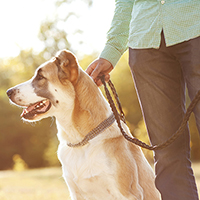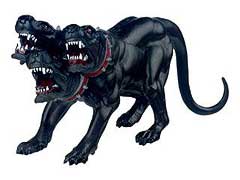When we consider calcium, tough teeth and bones come to mind. Your dog's diet ought to be rich in calcium to support healthy teeth and bones, but a fine balance exists in association to calcium and your dog's diet.
It is possible to have too much or too little calcium in your dog's diet. When a dog's diet contains too little calcium, your dog may cultivate a state referred to as rickets. This condition creates soft bones that bend under the weight of your dog.
In contrast, too much calcium can create bone abnormalities, as well. Large breed dogs, for example, who are supplied too much calcium as puppies in their diet, will build up large bones that are low in density. Strength is a problem with such bones due to the large amount of calcium supplements.
When your dog's diet includes appropriate levels of calcium, such bone abnormalities occur rarely. This is just one more reason to carefully decide on an appropriate diet for your dog. At all times check with your veterinarian to figure out the best amount of calcium in your dog's diet.
Calcium plays an important job in your dog's diet, but other vitamins and nutrients work hand in hand with calcium. Some minerals are mutually supporting. Calcium happens to be one of such mineral nutrients.
Calcium works jointly with phosphorus. A balance of the two nutrients calcium and phosphorus has to be present in a healthy ratio to make sure a dog diet that will take full advantage of the potential advantages for your pet. Studies involving animal nutrition illustrate that a ratio of 1.0 to 2.0 parts calcium should be coupled with 1.0 part phosphorus. When calcium and phosphorus ratios vary greatly from this range, bone issues result.
Dog diets consisting exclusively of meats will not give the correct quantity of calcium and phosphorus to build healthy bones. Such a diet results in a ratio of about 1.0 part calcium to 18 parts phosphorus. The range of absorption is where the trouble begins.
Vitamin D is a further nutrient that influences the absorption of calcium and phosphorus. If a dog's diet lacks the right amount of vitamin D, the other nutrients will not make available all the benefits to your pet. Excessive amounts of vitamin D can have toxic effects on your dog. It is imperative to sustain proper levels of vitamin D in your dog's diet. Again, feeding your dog food from a reliable company will allow you trust in knowing that your dog's diet is healthy.
During pregnancy or when your dog is nursing, elevated levels of calcium are vital in your dog's diet. At this time, feed your pet additional amounts of a balanced dog food. You should not have to supplement your pet at this time.
Milk fever, or eclampsia, can't be avoided with calcium supplements. Eclampsia is not a nutritional deficit, but a metabolic situation that affects the dog once the pups have been born and start nursing.
Avoid supplementing your dog's diet with calcium or other nutrients without precise talk with your vet. When calcium, for example, is out of balance, wellbeing can truly be effected harmfully. Feeding your dog a balanced diet is vital. Reputable dog food companies have researched animal nutrition to make sure the best possible health for your dog. Providing your dog's diet in a beneficial, balanced formula may well be the best way to take care of your pet.

 Top Three Summer Lawn Hazards for Dogs
Top Three Summer Lawn Hazards for Dogs
Top Three Summer Lawn Hazards for Dogs
Top Three Summer Lawn Hazards for Dogs
 These Flowing, Glamorous Coats Give Us Breed Envy
Seeming to float around the dog sho
These Flowing, Glamorous Coats Give Us Breed Envy
Seeming to float around the dog sho
 What is a responsible dog breeder?
Imagine yourself as an average pers
What is a responsible dog breeder?
Imagine yourself as an average pers
 Dealing with Canine Arthritis
If you have an older dog, look for
Dealing with Canine Arthritis
If you have an older dog, look for
 Dog Distemper Treatment – What Can I Do To Help My Dog?
What i
Dog Distemper Treatment – What Can I Do To Help My Dog?
What i